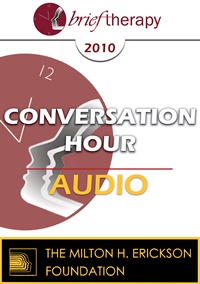Credit available - Click Here for more information
- Average Rating:
- Not yet rated
- Topic Areas:
- Speeches | Interviewing | Motivation | Therapeutic Relationship
- Categories:
- Evolution of Psychotherapy | Evolution of Psychotherapy 2017 | Online Continuing Education
- Faculty:
- William Miller, PhD
- Course Levels:
- Master Degree or Higher in Health-Related Field
- Duration:
- 55:47
- Format:
- Audio and Video
- Original Program Date:
- Dec 15, 2017
- Short Description:
- The clinical method of motivational interviewing (MI) evolved from the person-centered approach of Carl Rogers, maintaining his pioneering commitment to the scientific study of therapeutic processes and outcomes. The original developer of MI will summarize the development of this method, its linkage to Rogers, and research on its therapeutic processes, outcomes, and training.
- Price:
-
Sale is $29.00
price reduced from Base Price - $59.00

- Average Rating:
- Not yet rated
- Topic Areas:
- Conversation Hours | Virginia Satir | Milton Erickson
- Categories:
- Brief Therapy Conference | Brief Therapy Conference 2010
- Faculty:
- Jeffrey Zeig, PhD
- Duration:
- 1:00:56
- Format:
- Audio Only
- Original Program Date:
- Dec 11, 2010
- Short Description:
- BT10 Conversation Hour 11 - Personal Reflections on the Masters: Erickson, Frankl, Whitaker, Rogers & Satir - Jeffrey Zeig, PhD Personal Reflections on the Masters: Erickson, Frankl, Whitaker, Rogers & Satir with Jeff Zeig
- Price:
- $15.00 - Base Price
- Average Rating:
- Not yet rated
- Topic Areas:
- Invited Addresses | Psychotherapy | Milton Erickson
- Categories:
- Evolution of Psychotherapy | Evolution of Psychotherapy 1985
- Faculty:
- Carl Rogers, PhD | Ruth Sanford, MA | Miriam Polster
- Course Levels:
- Master Degree or Higher in Health-Related Field
- Duration:
- 1:31:20
- Format:
- Audio and Video
- Original Program Date:
- Dec 15, 1985
- Short Description:
- Invited Address Session 12 - Part 1 - Rogers, Kohut, and Erickson: A Personal Perspective on Some Similarities and Differences featuring Carl Rogers, PhD, and Ruth C Sanford, MA. With discussant Miriam Polster, PhD. Moderated by F Theodore Reid, Jr, MD.
- Price:
-
Sale is $59.00
price reduced from Base Price - $59.00

- Average Rating:
- Not yet rated
- Topic Areas:
- Invited Addresses | Storytelling | Psychotherapy
- Categories:
- Evolution of Psychotherapy | Evolution of Psychotherapy 1985
- Faculty:
- Erving Polster, PhD | Carl Rogers, PhD
- Duration:
- 1 Hour 20 Minutes
- Format:
- Audio Only
- Original Program Date:
- Dec 14, 1985
- Short Description:
- Description: With discussant Carl R Rogers, PhD. Moderated by F Theodore Reid, Jr, MD. Educational Objectives: To describe three ways of evoking stories in therapy. To name two purposes served by storytelling.
- Price:
- $15.00 - Base Price
- Average Rating:
- Not yet rated
- Topic Areas:
- Conversation Hours | Psychotherapy
- Categories:
- Evolution of Psychotherapy | Evolution of Psychotherapy 1985
- Faculty:
- Carl Rogers, PhD
- Course Levels:
- Master Degree or Higher in Health-Related Field
- Duration:
- 56:02
- Format:
- Audio and Video
- Original Program Date:
- Dec 12, 1985
- Short Description:
- Conversation Hour 07 featuring Carl A Rogers, PhD.
- Price:
-
Sale is $29.00
price reduced from Base Price - $59.00
Tags: Carl Rogers Psychotherapy
- Average Rating:
- Not yet rated
- Topic Areas:
- Topical Panels | Psychotherapy
- Categories:
- Evolution of Psychotherapy | Evolution of Psychotherapy 1985
- Faculty:
- Miriam Polster | Erving Polster, PhD | Carl Rogers, PhD | Ernest Rossi, PhD
- Course Levels:
- Master Degree or Higher in Health-Related Field
- Duration:
- 1:02:51
- Format:
- Audio and Video
- Original Program Date:
- Dec 12, 1985
- Short Description:
- Topical Panel 08 on the Language of Human Facilitation, featuring Erving Polster, PhD, Miriam Polster, PhD, Carl R Rogers, PhD, and Ernest L Rossi, PhD. Moderated by Aaron H Canter, PhD.
- Price:
-
Sale is $29.00
price reduced from Base Price - $59.00
- Average Rating:
- Not yet rated
- Topic Areas:
- Workshops | Psychotherapy | Therapeutic Relationship | Therapist Development
- Categories:
- Evolution of Psychotherapy | Evolution of Psychotherapy 1985
- Faculty:
- Carl Rogers, PhD | Ruth Sanford, MA
- Course Levels:
- Master Degree or Higher in Health-Related Field
- Duration:
- 2:55:50
- Format:
- Audio and Video
- Original Program Date:
- Dec 11, 1985
- Short Description:
- A brief discussion of my experience with demonstration interviews. A "client" will be selected from among those who volunteer. A thirty-minute demonstration interview will be held, followed by interaction between the group, the client and me.
- Price:
- $59.00 - Base Price

- Average Rating:
- Not yet rated
- Topic Areas:
- Clinical Demonstrations | Psychotherapy | Family Therapy
- Bundle(s):
- Pioneers of Psychotherapy Bundle
- Categories:
- Pioneers of Psychotherapy | Evolution of Psychotherapy | Evolution of Psychotherapy 1985
- Faculty:
- Carl Rogers, PhD
- Course Levels:
- Master Degree or Higher in Health-Related Field
- Duration:
- 00:59:00
- Format:
- Audio and Video
- Original Program Date:
- Dec 10, 1985
- Short Description:
- Carl Rogers (1985) demonstrates with Ann, who describes herself as suffering guilt and sadness after having put off becoming a mother to pursue her career. After deciding to have children, she miscarried twins and has since been unable to become pregnant. Rogers helps her access her own potential to experience herself more positively.
- Price:
- $59.00 - Base Price






